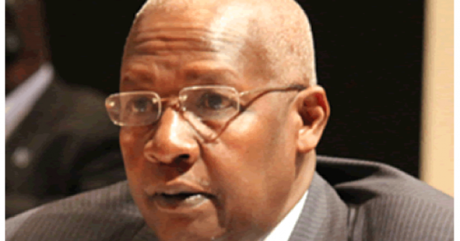U.K. officials lobbied for visa bar on Kutesa
The United Kingdom government considered a visa restriction against Uganda’s foreign affairs minister Sam Kutesa in connection with millions of dollars stolen when Uganda hosted the 2007 Commonwealth Heads of Government Conference (CHOGM), according to a 2010 confidential document by the U.S. ambassador, published by WikiLeaks.
Then ambassador, Jerry Lanier, described Kutesa’s “corruption as egregious” but also warned that then security minister Amama Mbabazi’s own corruption presented a greater challenge.
Mbabazi is today Prime Minister and Kutesa on Wednesday is to be confirmed as President of the United Nations General Assembly.
Officials in the U.K.’s Department for International Development (DFID) lobbied for visa restrictions “for senior Ugandan officials guilty of misusing $27 million allocated” to the November 2007 conference, according to the January 13, 2010 memo to several U.S. government agencies by then ambassador Lanier.
The Lanier memo proves that the U.S. government is aware that a close Washington ally had previously weighed revoking Kutesa’s visa.
An ongoing campaign on Change.org called on Secretary of State John Kerry to bar Kutesa from coming to the U.S. on account of his being censured for corruption by Uganda’s Parliament and having faced numerous corruption allegations. Kutesa also supports Uganda’s anti-Gay law which was signed by President Museveni in February and includes a sentence of life-in-prison for so-called “aggravated homosexuality” or people in committed same-sex relations. The Change.org campaign is expected to run through September when Kutesa presides over the General Assembly. The petition now has 12,492 signatures.
According to ambassador Lanier’s memo, the information that the U.K. considered barring Kutesa was conveyed to embassy officials in Uganda on January 7, 2010, by a British High Commission official, the Department for International Development, and Uganda’s Senior Governance Advisor — that “the U.K. is seriously considering visa restrictions for Ugandan officials guilty of embezzling CHOGM-related funds.”
“The British say their primary target is Foreign Minister Sam Kutesa, that recent visa bans in Kenya provide a model for similar sanctions in Uganda, and that the U.K. will likely ask for U.S. support once the British have completed their review of CHOGM expenditures,” the ambassador’s memo continued. “At least a dozen government ministries and several Ministers – including Kutesa, Vice President Gilbert Bukenya, and Public Works Minister John Nasasira – have been implicated in the CHOGM scandal.”
The reference to Kenya was presumably to the 2008 UK ban on David Mwiraria, Kenya’s environment minister, and Nicholas Biwott, a former minister based on corruption allegations.
The ambassador also wrote: “We regard Kutesa’s corruption as egregious, but believe Security Minister Amama Mbabazi’s continued misappropriation of public funds for personal gain will have a greater adverse impact on U.S. national interests in Uganda.”
“The British said the ongoing inquiry by Uganda’s Parliamentary Accounts Committee (PAC) into CHOGM expenditures,” the Lanier memo continued, “confirmed publicly what the British have known about CHOGM and Foreign Minister Kutesa since 2007.”
“The British said senior DIFD officials in London are lobbying for visa sanctions, and that visa restrictions recently imposed on corrupt Kenyan officials provide a model for Uganda.”
Kutesa, Nasasira and another Uganda official resigned as a result of the allegations in October 2011.
“Uganda’s CHOGM debacle is a major embarrassment for the British Commonwealth,” ambassador Lanier, further wrote. “Foreign Minister Kutesa has a history of corruption stemming back to his 1999 censure by Parliament for abuse of office while serving as State Minister of Finance. In both the 1999 scandal and CHOGM, Kutesa allegedly influenced government contracts for personal gain.”
Kutesa’s task during the CHOGM had been to arrange for the accommodations, venues, and the conferences. He however became involved in procurement for the vehicles for the conference and Uganda’s Public Accounts Committee in its audit report later found that he “bent procurement procedures” and some of the vehicles ordered, such as ambulances for example “were not as per specifications i.e in that the medical components were non-responsive to the specifications e.g they lacked oxygen cylinders, hooks, drug cabinets, emergency lights etc.”
Competitive bidding for contracts was ignored and one of the companies awarded a contract, Motor Care Uganda, that Kutesa reportedly once had interest in, had an expired trading license when it submitted its proposal.
Other reports indicate that as much as $150 million “disappeared” when Uganda hosted the gathering.
“Kutesa and Mbabazi’s misappropriation of public funds and interference with public processes continue to adversely affect the stability of Uganda’s nascent democratic institutions,” Lanier concluded.
In 2012, in what was widely derided as a show “trial” a judge dismissed the case against Kutesa and others for the alleged embezzlement of monies in connection to CHOGM for “lack of evidence” and he resumed his post as minister of foreign affairs.
Mr. Kutesa, is now the presumptive President of the General Assembly of the United Nations is scheduled to be confirmed by acclamation on June 11.
Lanier’s memo was addressed to several agencies, including The U.S. Secretary of State, The CIA, the U.S. Africa Command; and to the U.K. government.
The U.K. Foreign Office did not respond to questions sent by e-mail message seeking comment. Britain’s Permanent Representative to the United Nations, and U.S. Ambassador to the UN Samantha Power also didn’t respond to requests for comment sent through spokespersons.
In addition to presidents and prime ministers from Commonwealth member countries, Queen Elizabeth, as the titular leader, also attended the 2007 gathering that brought to Uganda 48 of the 53 member countries.








